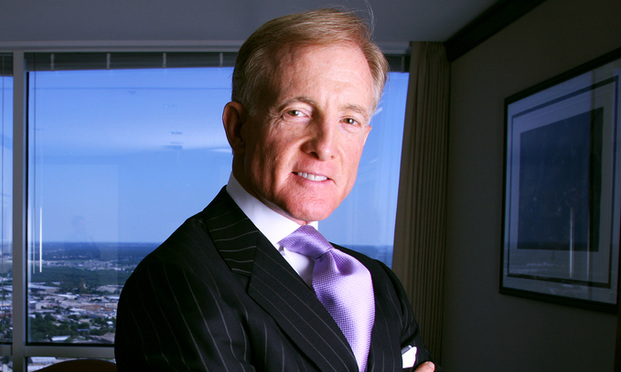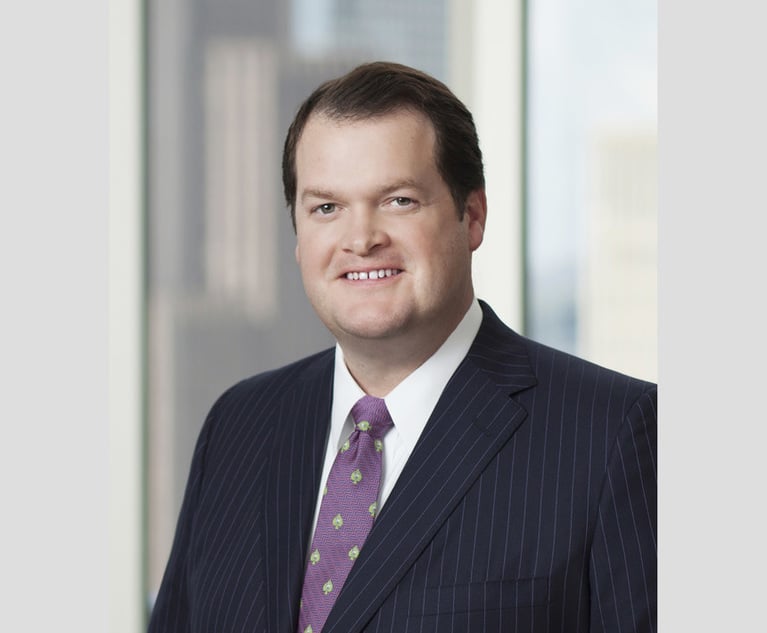With Sanction Looming for Bill Brewer, Justices Scrutinize His Pretrial Tactic
Throughout the 50-minute argument, justices scrutinized both sides' claims that attorney William "Bill" Brewer's pretrial survey was either a balanced survey, or a biased push poll. Justices weighed the elements needed for sanctioning a lawyer.
October 11, 2019 at 11:23 AM
5 minute read
 Bill Brewer. Photo: Photo Mark Graham
Bill Brewer. Photo: Photo Mark Graham
The outcome of a $177,000 sanctions fight involving firebrand Texas attorney Bill Brewer may rest on whether Texas Supreme Court justices believe a pretrial telephone survey that Brewer conducted was fair and balanced, as he claims, or untruthful and biased, as opponents allege.
In an oral argument, justices on the Texas Supreme Court peppered attorneys with questions about the circumstances where trial courts can sanction a lawyer for sending out a pretrial survey about a case.
The case, Brewer v. Lennox Hearth Products, involves Brewer Attorneys & Counselors partner Brewer of Dallas and New York, who conducted a pretrial public opinion survey while representing a defendant in a multimillion dollar products liability and wrongful death case. Although he maintains the survey was fair and balanced, his opponents characterize it as a "push poll" that used biased information and tainted the potential jury pool. The trial court issued $177,000 in sanctions against Brewer, and he appealed.
Throughout the 50-minute argument, justices scrutinized both sides' competing claims that it was either a balanced survey, or a biased push poll. Justices also questioned both sides on the elements that were needed to sanction a lawyer: whether a court must find he acted with bad faith, and his conduct substantially interfered with the judicial process.
It was a problem that the trial court that sanctioned Brewer make those two findings, said Vinson & Elkins partner George Kryder III of Dallas, who represented Brewer.
In Brewer's case, the court found that his attitude at a hearing on the motion for sanctions was nonchalant and combative, noted Justice Eva Guzman. She asked Kryder whether the trial court could base the sanction on Brewer's behavior at the hearing, or did it have to find that Brewer acted in bad faith at the time he commissioned the survey.
"You look at the conduct of the lawyer at the time he or she makes a decision," Kryder said.
Guzman asked Kryder how much Brewer's survey interfered with the court's function here, because it turned out there was never a trial and the case was over.
Kryder, agreeing that there was never a jury summoned, was interrupted by Justice Brett Busby. The justice said that if the Supreme Court ruled that a push poll was OK as long as there was never a trial, then attorneys could have as much influence on a jury pool as they wanted, so long as a trial didn't occur.
Kryder noted that he disagrees with his opponents' characterization of the survey as a push poll. He said it was balanced with questions that were beneficial and harmful to Brewer's client.
But Busby replied that both the trial court and an amicus brief in the case had alleged the survey was untruthful and inaccurate. If the evidence supports those claims, then why couldn't it support a bad-faith finding, he asked. Also, hypothetically, if the survey here really were a push poll, then could a court sanction a lawyer for it?
Kryder throughout his argument maintained that Brewer's survey was balanced and didn't count as a push pull, but he added that a sanction for a real push poll would be appropriate.
Ben Taylor of Ted B. Lyon & Associates in Mesquite, who represented appellees Ken and Becky Teel and Ross and Meg Rushing, said the judge who sanctioned Brewer heard days of testimony, reviewed exhibits and deliberated on the sanction for a year. He urged the court to defer to the trial court's fact-finding role, rather than reopening the issue to determine if justices believed it was a balanced survey versus a push poll.
Boyd said that Taylor's brief argued that it was not the right standard to find that an attorney can only face sanctions if there was bad faith conduct. He said, "Can you tell me what you think the correct standard is?"
Taylor cited Supreme Court precedent in In Re Bennett, explaining the standard is, "Conduct that threatens the integrity of the judicial system, and is intolerable."
Amicus attorney Brian Lauten, who argued on behalf of legal organizations that filed an amicus brief on the case, said that the justices should forget the term "push poll" or questions about whether the survey had questions both helpful and harmful to Brewer's client.
"There are lies in this poll," he explained, citing an example question from Brewer's survey that allegedly gave "completely false" information about the quality of insulation work and its role in the fire. "That false disinformation is completely wrong, and it's being given to the venire."
He pleaded with the court to prohibit this type of conduct.
"He wants to keep doing this," Lauten said about Brewer. "This is an incredible threat to the civil justice system."
Related story:
All Eyes on Fort Worth for Controversial Appellate Case
This content has been archived. It is available through our partners, LexisNexis® and Bloomberg Law.
To view this content, please continue to their sites.
Not a Lexis Subscriber?
Subscribe Now
Not a Bloomberg Law Subscriber?
Subscribe Now
NOT FOR REPRINT
© 2025 ALM Global, LLC, All Rights Reserved. Request academic re-use from www.copyright.com. All other uses, submit a request to [email protected]. For more information visit Asset & Logo Licensing.
You Might Like
View All
Energy Lawyers Field Client Questions as Trump Issues Executive Orders on Industry Funding, Oversight
6 minute read
Holland & Knight Hires Former Davis Wright Tremaine Managing Partner in Seattle
3 minute read
Kirkland Is Entering a New Market. Will Its Rates Get a Warm Welcome?
5 minute read
Trending Stories
- 1Firms Come Out of the Gate With High-Profile Litigation Hires in 2025
- 2Legal Departments, Firms Expect Gen AI to Boost ALSP Usage
- 3Law Firms Are 'Struggling' With Partner Pay Segmentation, as Top Rainmakers Bring In More Revenue
- 4Diversity Lab Alters DEI-Centered Verbiage on Mansfield Certification Website
- 5Tuesday Newspaper
Who Got The Work
J. Brugh Lower of Gibbons has entered an appearance for industrial equipment supplier Devco Corporation in a pending trademark infringement lawsuit. The suit, accusing the defendant of selling knock-off Graco products, was filed Dec. 18 in New Jersey District Court by Rivkin Radler on behalf of Graco Inc. and Graco Minnesota. The case, assigned to U.S. District Judge Zahid N. Quraishi, is 3:24-cv-11294, Graco Inc. et al v. Devco Corporation.
Who Got The Work
Rebecca Maller-Stein and Kent A. Yalowitz of Arnold & Porter Kaye Scholer have entered their appearances for Hanaco Venture Capital and its executives, Lior Prosor and David Frankel, in a pending securities lawsuit. The action, filed on Dec. 24 in New York Southern District Court by Zell, Aron & Co. on behalf of Goldeneye Advisors, accuses the defendants of negligently and fraudulently managing the plaintiff's $1 million investment. The case, assigned to U.S. District Judge Vernon S. Broderick, is 1:24-cv-09918, Goldeneye Advisors, LLC v. Hanaco Venture Capital, Ltd. et al.
Who Got The Work
Attorneys from A&O Shearman has stepped in as defense counsel for Toronto-Dominion Bank and other defendants in a pending securities class action. The suit, filed Dec. 11 in New York Southern District Court by Bleichmar Fonti & Auld, accuses the defendants of concealing the bank's 'pervasive' deficiencies in regards to its compliance with the Bank Secrecy Act and the quality of its anti-money laundering controls. The case, assigned to U.S. District Judge Arun Subramanian, is 1:24-cv-09445, Gonzalez v. The Toronto-Dominion Bank et al.
Who Got The Work
Crown Castle International, a Pennsylvania company providing shared communications infrastructure, has turned to Luke D. Wolf of Gordon Rees Scully Mansukhani to fend off a pending breach-of-contract lawsuit. The court action, filed Nov. 25 in Michigan Eastern District Court by Hooper Hathaway PC on behalf of The Town Residences LLC, accuses Crown Castle of failing to transfer approximately $30,000 in utility payments from T-Mobile in breach of a roof-top lease and assignment agreement. The case, assigned to U.S. District Judge Susan K. Declercq, is 2:24-cv-13131, The Town Residences LLC v. T-Mobile US, Inc. et al.
Who Got The Work
Wilfred P. Coronato and Daniel M. Schwartz of McCarter & English have stepped in as defense counsel to Electrolux Home Products Inc. in a pending product liability lawsuit. The court action, filed Nov. 26 in New York Eastern District Court by Poulos Lopiccolo PC and Nagel Rice LLP on behalf of David Stern, alleges that the defendant's refrigerators’ drawers and shelving repeatedly break and fall apart within months after purchase. The case, assigned to U.S. District Judge Joan M. Azrack, is 2:24-cv-08204, Stern v. Electrolux Home Products, Inc.
Featured Firms
Law Offices of Gary Martin Hays & Associates, P.C.
(470) 294-1674
Law Offices of Mark E. Salomone
(857) 444-6468
Smith & Hassler
(713) 739-1250






